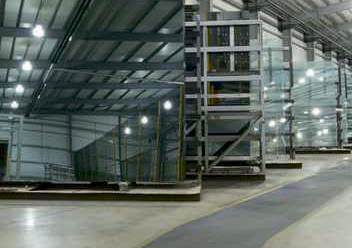The government policy for environmental development of the Russian Federation until 2030 aims, among other things, to build an efficient, competitive and green economy growth model whose maximum efficiency hinges on robust environmental stewardship and minimised environmental impact. The policy is also intended for promoting international cooperation on conservancy and environmental safety.
Vnesheconombank addresses the policy’s objectives by providing focused financing to environmentally oriented projects designed to introduce innovative, resource saving, environmentally safe and efficient technologies. Additionally, in 2013, Vnesheconombank, supported by the International Financial Corporation (IFC), engaged in building a mechanism for assessing energy efficiency of the Bank’s investment projects and preparing a portfolio of energy efficient projects for potential financing by international development institutions.
Since the Development Bank’s inception, Vnesheconombank’s management approved its engagement in 47 environmental stewardship and energy efficiency projects with a total value of RUB 1.2 tn and with Vnesheconombank’s commitment standing at RUB 779.5 bn.
As of late 2013, Vnesheconombank financed 31 environmental stewardship and energy efficiency projects through opening credit facilities with a total value of RUB 581.5 bn and Vnesheconombank’s commitment — RUB 399.4 bn.
We are also financing, through equity investment, another project with a total value of RUB 92.4 bn and Vnesheconombank’s commitment standing at RUB 43.4 bn.
Success story

Construction of a 600 t/d Float Glass Factory
Project initiator/Borrower: Caspian Flat Glass OJSC
Total project value: RUB 10.5 bn
Vnesheconombank’s commitment: RUB 7.5 bn
The project is planned to bring 392 new jobs
The project’s budgetary effect is expected to be RUB 1.9 bn
The project provides for constructing a knowledge-intensive facility for the production of transparent, tinted and reflective float glass in the village of Tyube (Republic of Dagestan), with a nominal capacity of 600 tonnes per day. The facility’s products will be used to supply high quality glass to construction businesses in the North Caucasian, Southern, Central and Volga Federal Districts of Russia, and to CIS and other foreign countries. The project is being implemented as part of the South of Russia federal target programme.
The facility’s products will offer unique energy saving properties due to its selective light transmission and flash-proof capabilities, and ability to dynamically regulate the glass colour. They will help reduce indoor heat losses by 30% in winter and sunlight penetration by 35 — 40% in summer. The technologies applied in the facility take into account the developments of major international market-leading glass manufacturers.
In November 2013, the project’s operator obtained an authorisation to commission the facility. The factory is currently operating in test mode. It is planned to reach its full capacity in 2014.
Implementation of measures intended to secure the sustainable development of Baikalsk single-industry town and address the issues related to closing the Baikalsk Pulp and Paper Mills (BPPM) and diminishing the negative environmental impact of waste resulting from operations of the mills
Project is implemented by Vnesheconombank in cooperation with LLC VEB Engineering
Based on the results of the conducted technical and economic research, the Russian Government resolved to terminate business operations of BPPM in order to stop the negative environmental impact and preserve Russia’s natural heritage — Lake Baikal.
Pursuant to the government’s resolution, Vnesheconombank implemented a set of measures aimed at ensuring the sustainable development of Baikalsk single-industry town. The Bank financed the BPPM’s operations during the closing period, including the payoffs of dismissal compensation and other social benefits to employees due at employment termination, as well as funded Baikalsk infrastructure facilities.
Implementing the Government Contract with the Russian Ministry of Natural Resources and Environment, VEB Engineering ran an engineering survey, developed the technical concept and design documents to address the negative environmental impact of waste resulting from BPPM’s operations with a total weight over 6.2 million tonnes. The work was conducted in compliance with the Federal Target Programme named “Protection of Lake Baikal and Sosial and Economic Development of Baikal Natural Area for

Engineering solutions proposed by VEB Engineering to address the negative impact of the waste disposal sites are compliant with the requirements of environmental laws, are environmentally safe and efficient. Their implementation will require engagement of 428 persons, which will solve a part of issues related to employment of BPPM’s staff dismissed as a result of BPPM’s shutdown. Moreover, the company is planning to take a number of measures seeking to renovate BPPM’s and Baikalsk’s infrastructure so as to handle social issues related to BPPM’s shutdown and support the social and economic development of the single-industry town of Baikalsk and the Slyudyanskiy District.
The environmental impact assessment materials have already undergone public hearings, while the design documents are currently under state environmental expert evaluation by the Division of the Federal Service for Supervision of Natural Resources for the Irkutsk Region.




